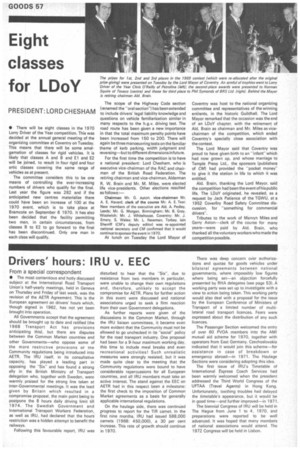Drivers' hours: IRU v. EEC
Page 59

If you've noticed an error in this article please click here to report it so we can fix it.
From a special correspondent
• The most contentious and hotly discussed subject at the International Road Transport Union's half-yearly meetings, held in Geneva on Thursday and Friday of last week, was the revision of the AETR Agreement. This is the European agreement on drivers' hours which, though signed in 1962, has not yet been brought into operation.
All Governments accept that the agreement should be brought up to date and ratified (the 1968 Transport Act has provisions anticipating this), but there are disputes between the Common Market countries and other Governments—who oppose some of the more restrictive provisions at the Community regulations being introduced into AETR. The IRU itself, in its consultative capacity, has played a leading part in opposing the -Six" and has found a strong ally in the British Ministry of Transport delegation who, together with Sweden, were warmly praised for the strong line taken at inter-Governmental meetings. It was the lead given by Britain which resulted in a compromise proposal, the main point being to postpone the 8 hours daily driving limit tilt 1974. The Swedish Government and International Transport Workers Federation, as well as IRU, had declared that the hours restriction was a hidden attempt to benefit the railways.
Following this favourable report, IRU was
disturbed to hear that the -Six", due to resistance from two members in particular, were unable to change their own regulations and, therefore, unlikely to accept the compromise for AETR. Plans for further action in this event were discussed and national associations urged to seek a firm reaction from their own Government delegations.
As further reports were given of the discussions in the Common Market, through the IRU liaison committees, it became even more evident that the Community must not be allowed to go unchecked in its "social" policy for the road transport industry. One proposal had been for a 9-hour maximum working day, this time to include meal breaks and even recreational activities! Such unrealistic measures were strongly resisted, but it was roads quite clear to the meeting that the Community regulations were bound to have considerable repercussions for all European countries, and all IRU members must take an active interest. The stand against the EEC on AETR had in this respect been a milestone: the first check to the imposition of Common Market agreements as a basis for generally applicable international regulations.
On the haulage side, there was continued progress to report for the TIR carnet. In the first nine months, IRU had issued 588,000 carnets 11968: 450,000), a 30 per cent increase. This rate of growth should continue in 1970. There was deep concern over authorizations and quotas for goods vehicles under bilateral agreements between national governments, where impossibly low figures where being set—an objection forcefully presented by RHA delegates (see page 53). A working party was set up to investigate with a view to action being taken. This working party would also deal with a proposal for the issue by the European Conference of Ministers of Transport of a limited number of multilateral road transport licences. Fears were expressed about the distribution of any such licences.
The Passenger Section welcomed the entry of over 60 PV0A members into the AMI mutual aid scheme for 1970, together with operators from East Germany. Czechoslovakia indicated that it would join this scheme—for assistance in case of breakdown or emergency abroad—in 1971. The Haulage Sections were considering adopting this idea.
The first issue of IRU's Timetable of International Express Coach Services had been warmly welcomed when the president addressed the Third World Congress of the UFTAA (Travel Agents) in Hong Kong. Unfortunately, teething troubles had delayed the timetable's appearance, but it would be in good time—and further improved—in 1971.
The biennial Congress of IRU will be held in The Hague from June 1 to 4, 1970. and preparations were reported to be well advanced. It was hoped that many members of national associations would attend. The 1972 Congress will be held in Lisbon.




































































































































































































































